Highlight

Successful together – our valantic Team.
Meet the people who bring passion and accountability to driving success at valantic.
Get to know usMaximum flexibility, agility and data efficiency at optimal cost
IBM Cloud Pak for Data (IBM CP4D) overcomes challenges such as data silos, numerous data sources and a lack of AI expertise. The platform covers the entire DevOps lifecycle, adapts agilely to company requirements and can be operated on-premises or in the cloud.

Data-driven companies that rely on business analytics are more successful in the market, they take advantage of market opportunities faster, and enjoy many advantages as compared to the competition. This is not just a guess, but a verified, hard fact. Recent surveys confirm these benefits.
Here’s an example: IBM interviewed 13,484 C-Class managers from 20 industries and 98 countries for their Global C-suite Study (20th Edition), and the results clearly show that 69% of technology-driven digital torchbearers, i.e. companies that adapt and use digital technologies quickly, achieved excellent sales increases well above their competitors’ average. In fact, their profitability could be increased by as much as 71% by using data analytics technologies (more details here).
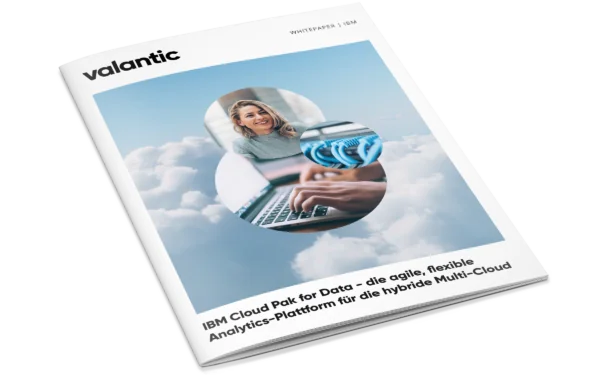
IBM Cloud Pak for Data: the Agile, Flexible Analytics Platform for the Hybrid Multi-Cloud
The focus of this White Paper is on practical application scenarios, added business value and, above all, you and your business success.

How companies can profit from IBM Cloud Pak for Data
The use of an agile, integrated data analytics platform, complemented by machine, learning and AI services, has been proven to generate significant business benefits. Most companies are also aware of this. But they face a number of complex challenges that make it difficult, delay, or even prevent the introduction of an optimal analytics solution for a long time. These include, for example, data silos, hundreds or thousands of data sources that need to be integrated to form a consolidated decision-making basis, a lack of AI expertise at the company, or different platforms in the cloud and on-premise on which decision-relevant data is stored.
IBM Cloud Pak for Data addresses each of these challenges, paving the way for companies to be more productive, more professional, more cost-effective, and more successful. IBM Cloud Pak for Data maps the entire DevOps life cycle. The platform adapts with agility and flexibly to your company’s challenges. It runs on-premise, managed, in the private cloud or in the public cloud, offers many pre-configured services, and integrates data from any source, from your own environment or from cloud providers such as Google, AWS, Microsoft, and others. The IBM Cloud Pak for Data offers maximum flexibility, agility, and efficiency with an optimal balance between work required and costs.
Excellent increases in sales and profitability far above average.
Minimal effort, maximal flexibility, agility, and data efficiency.
Use scarce resources such as raw materials, personnel, and capital optimally – with AI.
Partially automated microservices arcihtecture, Assistant, Watson Cognos Analytics, Planning Analytics/TM1, DB2, DWH, and RedHat OpenShift
AutoAI: AI independently develops optimized models that can bei exported an Python code
Return on investment (ROI) according to Forrester: 86% to
Quick integration of a large number of data sources without time-consuming preparation or mirgation
Advantage for business users: With a single SQL query statement, simultaneously search e.g. in Oracle and DB2 databases, in Hadoop clusters, SQL servers, NoSQL data stocks, and Excel tables.
Data scientists, business analysts, data engineers, controllers, business users, and app developers work together transparently on one platform.
Information architecture and procurement models
IBM Cloud Pak for Data is an integrated, secure, highly scalable platform that implements an information architecture for data and artificial intelligence in any cloud. The Cloud Pak combines the technologies and solutions relevant to data analysis that IBM has developed. IBM Cloud Pak for Data runs under a partially automated architecture, including Watson Assistant, Watson Discovery, Cognos Analytics, Planning Analytics/TM1, DB2, DWH, and Red Hat OpenShift. It can be used in every operating/procurement model, from on-premise to managed to complete “Software-as-a-Service” from the public cloud.
Each operating/procurement model has its own advantages and disadvantages: In the Software-as-a-Service model, the solution provider is responsible for providing and operating the platform. On-premise and in the private cloud, customers have to do this on their own, but they also retain full control over their data. Hybrid procurement models combine the advantages of on-premise/private cloud and public cloud.
What makes Cloud Pak for Data special: With the Kubernetes orchestration platform OpenShift, which extends Kubernetes to include essential business functions, IBM has containerized all software services. In addition, there is a virtualization layer that combines all distributed data sources into a unified, consolidated user view. This is a huge advantage, because valuable time is not lost copying or preparing data, as with other common solutions. For example, business users search with a single SQL query statement in Oracle and DB2 databases, Hadoop clusters, SQL servers, NoSQL data stores, and Excel spreadsheets, as if they were a single system.IBM’s newly developed innovative data virtualization service consolidates thousands of distributed, heterogeneous data sources without preparation and transformation routines, making them searchable and highly available to business users at the same time. Virtual merging eliminates data silos.
Data sources that IBM Cloud Pak for Data integrates with excellent performance thanks to its virtualization layer plus container without data migration:
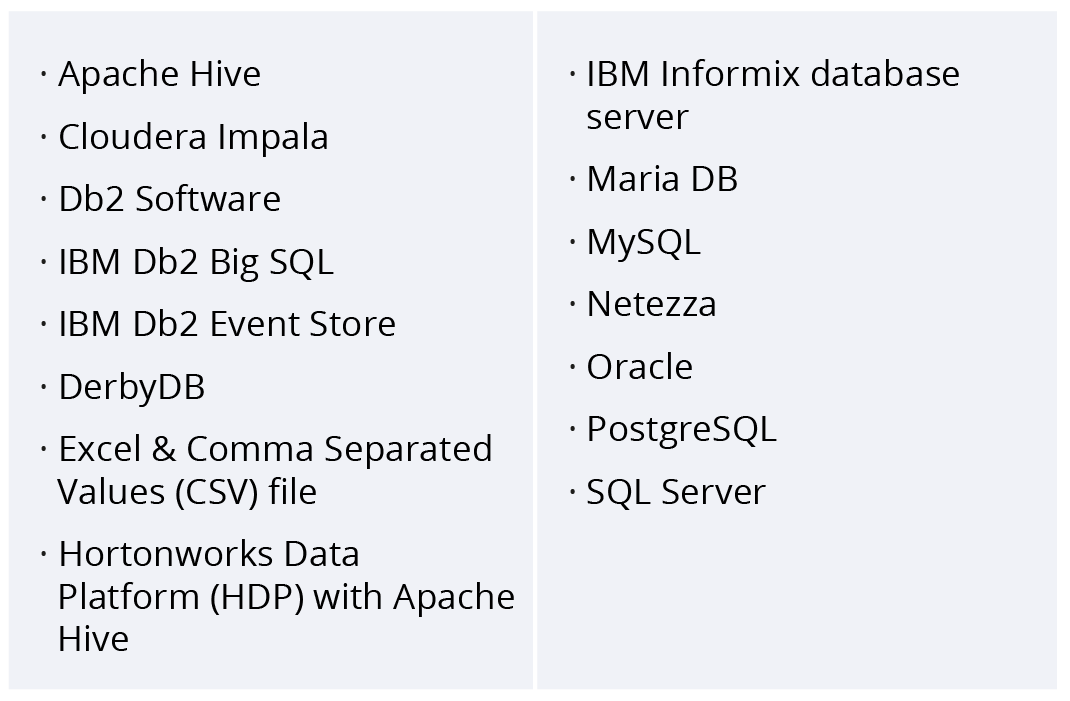
Supported Data Sources, Source: IBM
For businesses, containers are based on Red Hat OpenShift – a microservices architecture that underlies the IBM Cloud Pak for Data – providing other critical flexibility, speed, and cost benefits. If, for example, there are cost reasons for this, then containers and services can be moved relatively easily from a cloud platform to a more cost-effective cloud or on-premise server. For example, if a company acquires a competitor’s business unit, then containers can also be used to integrate its IT services quite easily and without any problems.
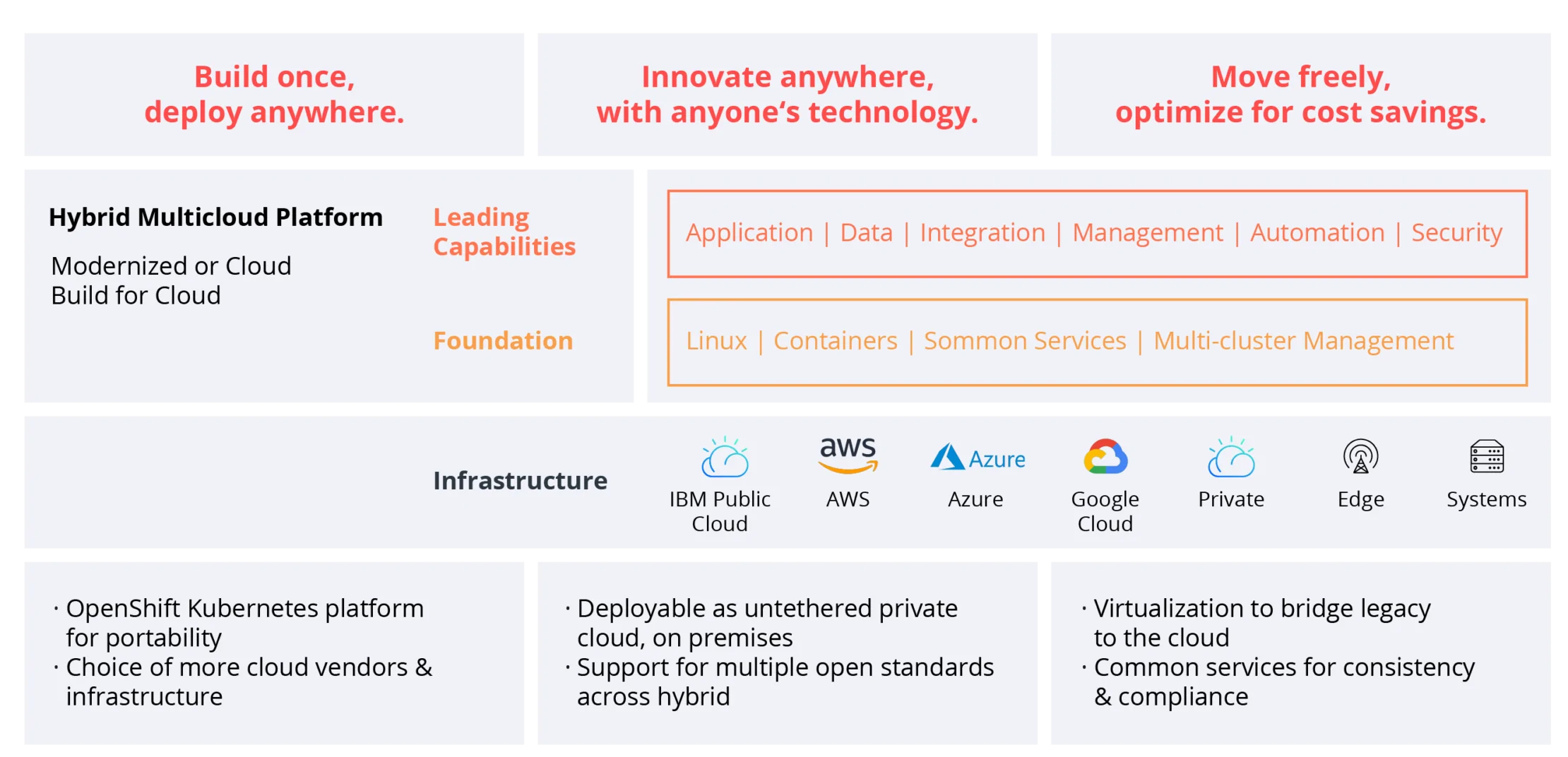
An overview of the IBM Cloud Pak for Data information architecture, Source: IBM

White Paper: IBM Cloud Pak for Data
Enterprise Analytics for the Hybrid Multicloud: The White Paper on the AI Analytics Platform IBM Cloud Pak for Data
Data virtualization and the self-services provided generate many significant benefits. According to Forrester, IBM Cloud Pak for Data reduces the ETL requests required to build an enterprise data warehouse by 25% to 64%. The effort required to maintain the entire infrastructure required to run analytics applications is reduced by 65% to 85% with the Cloud Pak for Data.
Forrester estimates the average return on investment, based on a three-year period, to be between 86% and 158%. These calculations were based on a model organization with annual sales of USD 2 billion and 8000 employees. (Source: The Total Economic Impact of IBM Cloud Pak for Data). The data virtualization layer developed by IBM “democratizes” data transparency across the enterprise, improves data protection and governance, and helps companies avoid costly data migration projects. One chief executive told Forrester in the survey: “We believe we are in a position to perform better analyses easily. We can now present data sets to business analysts and data scientists without having to migrate the data, which would not only be expensive, but would also delay access to that data.”
Collect – Organize – Analyze - Infuse
IBM Cloud Pak for Data turns raw data into valuable information. To facilitate and accelerate the use of artificial intelligence in data analysis, companies follow a simple implementation process that is divided into four phases:

The AI leader
Collect
IBM Cloud Pak for Data quickly and easily combines all data sources and data storage systems relevant for analysis into a single user view. This eliminates time-consuming and costly transformation and migration processes.
Organize
The Watson Knowledge Catalog supports the subsequent organization, classification, and governance of data with policies and rules. With the Watson Knowledge catalog, companies develop an information architecture that precisely addresses their analytical and information requirements.
The catalog enables a “shop-for-data,” supports users with a glossary, and thus represents an essential basis for the extended use of data. In addition to these governance aspects, which can extend up to a data origin analysis (data lineage), simple data transformation/ETL also takes place on this level.
Analyze
Analytics services analyze and visualize extensive data sets based on the information architecture created. For example, companies create Cognos dashboards or use the SPSS modeler for data mining and statistical analysis. The AutoAI service is part of the service portfolio: Artificial intelligence develops automated and self-developed AI models that are best suited for analyzing the data sets available in each case. This is a task that usually takes weeks. AutoAI systematically tests a wide range of AI models systematically, makes many adjustments automatically, and in the end makes recommendations about which AI model will succeed the fastest for the respective task.
In particular, the model created can also be exported as Python code and used further. This saves even experienced data scientist a lot of time and less experienced data scientists have a good basis for making a start. Overall, AutoAI allows even companies with less or no data science skills to use and deploy artificial intelligence in their own company.
Infuse
With Watson Machine Learning, artificial intelligence becomes an integrated component for challenging data analyses and can thus be integrated directly into business processes. This allows for the operationalization/industrialization of AI. In addition to operating AI models, other aspects play an increasingly important role:
These four aspects, which contribute significantly to the successful operationalization of AI models, are fully addressed in the Cloud Pak via the Watson OpenScale service.
IBM Cloud Pak for Data already comes with many pre-configured services for practical use at companies, including AI, analytics, dashboards, data governance, industry solutions, data sources, and developer tools. For a detailed overview of all services, click here. Below you will find a selection of proven, particularly exciting application scenarios with high added value.
Data warehousing & data transformation
A rapidly growing company has acquired several business units and wants to integrate the new partners into a uniform IT architecture as quickly and efficiently as possible. With IBM’s data virtualization layer, it is possible to efficiently manage many local data pots, systems, and reports in different locations without having to migrate the data sources.
However, the construction of a classic enterprise data warehouse is also possible without any problems. The IBM Cloud Pak for Data speeds up the necessary ETL processes (Extract, Transform, Load) and reduces costs. The analysis of the data and visualization of the results are subsequently performed by specialist users with IBM Cognos analytics as an optional component of the Cloud Pak for Data.
For specialist users - the AI self-service "AutoAI"
A company wants to use self-learning artificial intelligence to improve its forecasts and put its decisions on a more solid, data-based basis. However, the company does not employ any experts such as data scientists who are very familiar with the new technologies.
With the AI self-service AutoAI, even specialist users without special AI knowledge can determine whether and if which AI models makes sense and are successful in their specific use case. Specialist users select the relevant datasets, AutoAI independently tests the relevant AI models, and then automatically provides a strengths-weaknesses analysis at the end of the process. Creation takes only a few minutes. The result can be put directly into production and integrated into existing or new business processes.
Going from zero to one hundred working together: The end-to-end AI solution platform
A wholesaler wants to unify the work of its data analysts and integrate it into its business processes. With IBM Cloud Pak for Data, various roles such as data scientists, business analysts, data engineers, controllers, business analysts, and app developers work transparently on the same platform. The end-to-end integration of processes and roles enables faster and greater penetration of AI across the enterprise.
Make the most of scarce resources
Scarce resources, which have to be optimized according to availability, costs, or benefits, are available in every company across all sectors, be they personnel, materials, or capital. IBM Cloud Pak for Data optimizes the use of operating resources, quickly reducing costs, double allocation, and penalties.
Here’s an example: The marketing department of a large service provider would like to invite you to a workshop. Selected customers are supposed to receive a fine bottle of wine in advance. With the help of Cloud Pak for Data, marketing analyzes, among other things, the size of the company, the position, the personal preferences of the guest, and the customer’s history, to determine which customers are worth the investment and what return on investment can be expected on which level. In addition, there are what-if simulations for better planning in sales, marketing, production, and finance.
Chatbots for dialogue with customers and employees
IBM Cloud Pak for Data uses the conversational AI built into the Watson Assistant to conduct dialogues in natural language. Chatbots generate several benefits: They are ready to go 24×7, they increase customer satisfaction, and relieve qualified personnel who can devote themselves to more important tasks. The Watson Assistant is available in multiple languages and can be integrated into internal corporate systems such as CRM or ERP. The integration into the Cloud Pak for Data thus allows the operation of the chatbot in the customer’s environment and not as a service from the public cloud. Many customers have discovered that this is an advantage: Access to the data becomes easier and more secure. In addition, further customer-specific dialogues can be designed.
Existing IBM customers who want to use the IBM Cloud Pak for Data will receive a modernization bonus. The services highlighted in blue in the diagram below can be used in the standard base and standard enterprise licenses. Depending on the workload of the services and, where applicable, volume, the system is based on virtual processor cores (VPC). If a company purchases a basic license, it can use the blue services depending on its flexible use of individual, even changing requirements. Additional services marked in green are priced separately and the license/subscription is only valid for the service purchased in each case. Existing customers will receive a bonus from IBM, which means that when they purchase the modernization of a green additional service, they will receive additional blue VPCs free of charge.
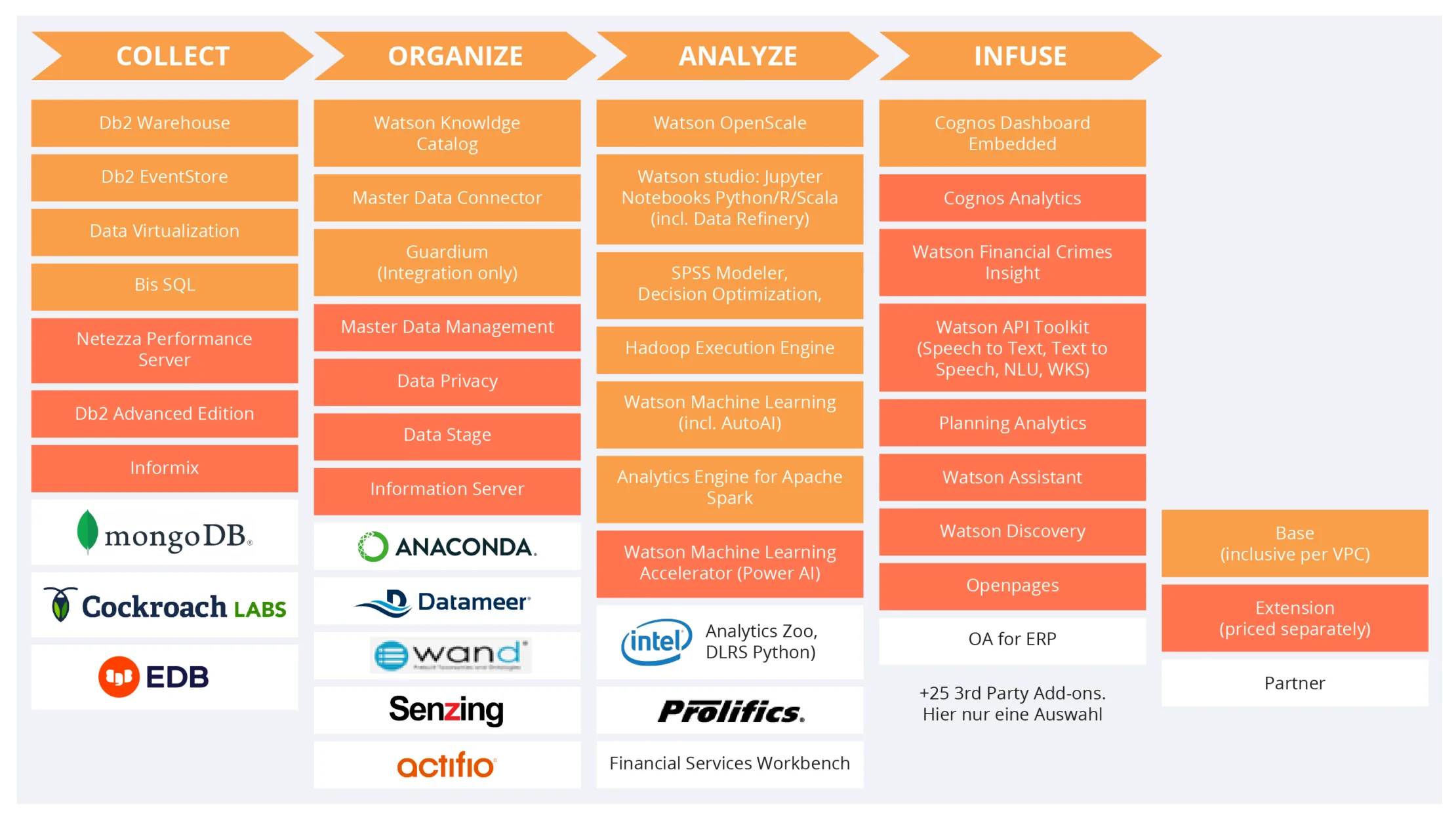
IBM Cloud Pak for Data license model at a glance: Blue services are included in the base license and can be used flexibly. Green services are priced separately. IBM core customers receive free virtual processor cores for their blue services when they purchase a green service, Source: IBM.
The biggest challenge in scaling data-driven and AI-based decision processes is unused data. IBM Cloud Pak for Data is a unified platform that enables companies to consolidate their existing data silos (virtually) and use the data holistically for descriptive, predictive, and prescriptive analytics. This can be done locally or across multiple clouds without moving the data.
With IBM Cloud Pak for Data, companies simplify access to their data and provide their employees with valuable knowledge that is relevant to their jobs. The platform automatically detects and curates data and ensures that policies to protect usage are securely followed. With IBM Cloud Pak for Data, companies can gain faster business and success insights with an integrated, modern, high-performance cloud data warehouse.
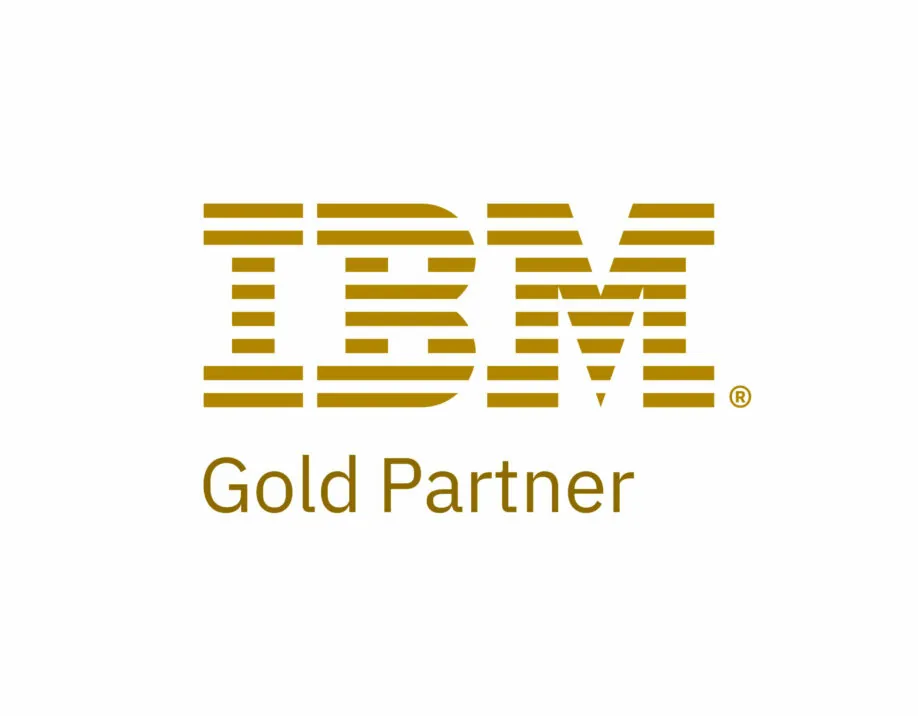
IBM Gold Partner
Thanks to its long-standing gold partnership with IBM, valantic is the licensing professional that provides companies with comprehensive support and advice: from product selection and the choice of license model to implementation, support and training in the ISO-certified valantic Academy. The experts at valantic support you with their expertise in precisely these areas.
Further information on IBM products and services can be found at here.

Martin W. Vierrath
Arrange a no-obligation consultation with your IBM Cloud Pak for Data expert now.
valantic